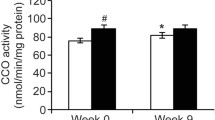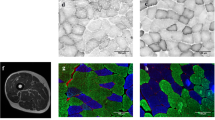Abstract
Thirteen standard-bred horses were trained intensively for 34 weeks and detrained for 6 weeks to study skeletal muscle adaptations to prolonged training, overtraining and detraining. Training included endurance (phase 1, 7 weeks), high-intensity (phase 2, 9 weeks) and overload training (OLT) (phase 3, 18 weeks). During phase 3, horses were divided into two groups, OLT and control (C), with OLT horses performing greater intensities and durations of exercise than C horses. Overtraining was evident in OLT horses after week 31 and was defined as a significant reduction in treadmill run time in response to a standardised exercise test (P<0.05). Relationships between peripheral (skeletal muscle) and whole body (maximum O2 uptake, V.O2, max, treadmill run time) adaptations to training were determined. Prolonged training resulted in significant adaptations in morphological characteristics of skeletal muscle but the adaptations were limited and largely completed by 16 weeks of training. Fibre area increased in all fibres while the number of capillaries per fibre increased and the diffusional index (area per capillary) decreased. Mitochondrial volume density continued to increase throughout 34 weeks of training and paralleled increases in V.O2,max and treadmill run time. Significant correlations were noted between mitochondrial volume and V.O2,max (R=0.71), run time and V.O2,max (R=0.83) and mitochondrial volume and run time (R=0.57). We conclude that many of adaptive responses of muscle fibre area and capillarity occur in the initial training period but that markers of oxidative capacity of muscle indicate progressive increases in aerobic capacity with increases in training load. The lack of differences between C and OLT groups indicated that there may be an upper limit to the ability of training stimulus to evoke skeletal muscle adaptive responses. There was no effect of overtraining or detraining on any of the adaptive responses measured.
Similar content being viewed by others
Author information
Authors and Affiliations
Additional information
Received: 19 August 1997 / Received after revision: 25 November 1997 / Accepted: 23 January 1998
Rights and permissions
About this article
Cite this article
Tyler, C., Golland, L., Evans, D. et al. Skeletal muscle adaptations to prolonged training, overtraining and detraining in horses. Pflügers Arch 436, 391–397 (1998). https://doi.org/10.1007/s004240050648
Issue Date:
DOI: https://doi.org/10.1007/s004240050648




